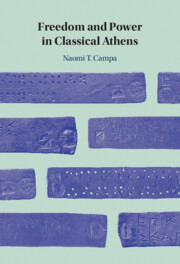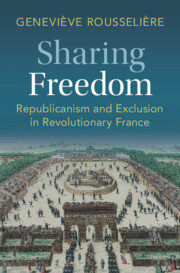342 results
Introduction
-
- Book:
- Family Matters
- Published online:
- 27 May 2024
- Print publication:
- 31 July 2024, pp 1-28
-
- Chapter
- Export citation
10 - Liberty, Violence and Practical Reason:
- from Part III - The Religious Epistemology of the Cambridge Platonists
-
- Book:
- The Cambridge Platonists and Early Modern Philosophy
- Published online:
- 09 May 2024
- Print publication:
- 16 May 2024, pp 269-285
-
- Chapter
- Export citation
Expanding Freedom: A Response
-
- Journal:
- Cambridge Journal of Postcolonial Literary Inquiry , First View
- Published online by Cambridge University Press:
- 16 May 2024, pp. 1-13
-
- Article
-
- You have access
- Open access
- HTML
- Export citation
Paulin Hountondji: The Struggle for Meaning and the Struggle for Action
-
- Journal:
- African Studies Review , First View
- Published online by Cambridge University Press:
- 29 April 2024, pp. 1-5
-
- Article
-
- You have access
- HTML
- Export citation
Social Equality and Wrongful Discrimination: Introduction to the Special Issue on Moreau's Faces of Inequality
-
- Journal:
- Dialogue: Canadian Philosophical Review / Revue canadienne de philosophie / Volume 63 / Issue 1 / April 2024
- Published online by Cambridge University Press:
- 23 April 2024, pp. 1-7
-
- Article
- Export citation
Replies to Critics of The Fiery Test of Critique
-
- Journal:
- Kantian Review , First View
- Published online by Cambridge University Press:
- 19 April 2024, pp. 1-13
-
- Article
- Export citation
Chapter 1 - Introduction
-
- Book:
- Freedom and Power in Classical Athens
- Published online:
- 04 April 2024
- Print publication:
- 11 April 2024, pp 1-17
-
- Chapter
- Export citation
Chapter 2 - Democratic Eleutheria as Positive Freedom
-
- Book:
- Freedom and Power in Classical Athens
- Published online:
- 04 April 2024
- Print publication:
- 11 April 2024, pp 18-55
-
- Chapter
- Export citation
Chapter 3 - Oratorical Ambiguity
-
- Book:
- Freedom and Power in Classical Athens
- Published online:
- 04 April 2024
- Print publication:
- 11 April 2024, pp 56-87
-
- Chapter
- Export citation
1 - Plural Beginnings
-
- Book:
- Sharing Freedom
- Published online:
- 28 March 2024
- Print publication:
- 04 April 2024, pp 31-74
-
- Chapter
- Export citation
Introduction
-
- Book:
- Sharing Freedom
- Published online:
- 28 March 2024
- Print publication:
- 04 April 2024, pp 1-30
-
- Chapter
- Export citation
Proops’s ‘Nugget of Gold’ in Kant’s Dialectic
-
- Journal:
- Kantian Review , First View
- Published online by Cambridge University Press:
- 04 April 2024, pp. 1-9
-
- Article
- Export citation

Freedom and Power in Classical Athens
-
- Published online:
- 04 April 2024
- Print publication:
- 11 April 2024
Ian Proops: Kant on Transcendental Freedom (The Fiery Test of Critique: Chs. 11–12)
-
- Journal:
- Kantian Review , First View
- Published online by Cambridge University Press:
- 04 April 2024, pp. 1-8
-
- Article
- Export citation

Sharing Freedom
- Republicanism and Exclusion in Revolutionary France
-
- Published online:
- 28 March 2024
- Print publication:
- 04 April 2024
Chapter 22 - The Anti-Character
- from Part IV - Traditions and Trends, Techniques and Forms
-
-
- Book:
- Pirandello in Context
- Published online:
- 14 March 2024
- Print publication:
- 21 March 2024, pp 179-186
-
- Chapter
- Export citation
2 - The Interpreter’s Self
-
- Book:
- Demystifying Treaty Interpretation
- Published online:
- 07 March 2024
- Print publication:
- 14 March 2024, pp 23-48
-
- Chapter
- Export citation
2 - The many facets of social choice theory
- from Part I - Social Choice and Capabilities
-
-
- Book:
- Social Choice, Agency, Inclusiveness and Capabilities
- Published online:
- 28 March 2024
- Print publication:
- 14 March 2024, pp 17-41
-
- Chapter
- Export citation
7 - Freedom and the Ethics of Educational Authority
- from Part I - Traditions in Ethics and Education
-
-
- Book:
- The Cambridge Handbook of Ethics and Education
- Published online:
- 07 March 2024
- Print publication:
- 14 March 2024, pp 125-144
-
- Chapter
- Export citation
8 - Exploring Sen on self-interest and commitment
- from Part II - Inclusiveness, Social and Individual Agency
-
-
- Book:
- Social Choice, Agency, Inclusiveness and Capabilities
- Published online:
- 28 March 2024
- Print publication:
- 14 March 2024, pp 170-201
-
- Chapter
- Export citation



